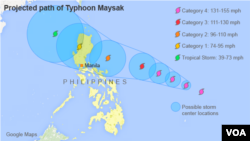Authorities in the northern Philippines province of Aurora prepared to evacuate thousands of residents Friday, telling tourists to head home or bunker down before a typhoon hits northeastern coastal areas sometime over the Easter weekend.
Typhoon Maysak was losing strength as it approached Aurora but was still expected to bring strong winds and dump heavy rains when it crosses northern areas of the main Luzon island on Sunday, the weather bureau said.
About 10,000 foreign and Filipino tourists have gone to Baler Bay in Aurora, a popular spot for surfers, since the holiday began on Thursday, officials said. Baler town lies about 150 km (95 miles) northeast of the capital, Manila, and has a population of about 36,000.
"Tomorrow, we will impose a preemptive evacuation to escape from the typhoon," said Elson Egargue, the Aurora disaster council’s head engineer. He said more than 50 schools and gymnasiums in Aurora were ready to take displaced people.
People in Baler would be told not to swim after Friday afternoon and fishing boats already had been stopped from going to sea, Egargue said in a radio interview.
Resort owners in Baler warned their guests about the approaching storm, with some tourists planning to leave the beaches early, radio reports said.
Losing strength but still dangerous
A top-rated category 5 typhoon earlier this week, Maysak has weakened to category 2, with winds gusting up to 185 kilometers per hour (115 mph), the weather bureau said.
Maysak was about 700 kilometers (435 miles) northeast of Virac on Catanduanes island on Friday. It was moving slowly northwest and would weaken further into a tropical storm by the time it makes landfall on Sunday, the weather bureau said.
"This typhoon can still be destructive ... Even at 120 to 150 kph, it can still bring destructive winds," Raymund Liboro, assistant secretary of the Science and Technology department, said at a briefing. He said winds would be strong enough to uproot trees, blow off roofs and topple electric posts.
The typhoon could damage rice and corn crops in central and northern Philippines. But damage is likely to be minimal because the major rice harvest was finished around February.
About 20 major typhoons pass through the Philippines yearly. Almost 8,000 people were killed or missing after Haiyan, a category 5 typhoon, struck central provinces in 2013.





